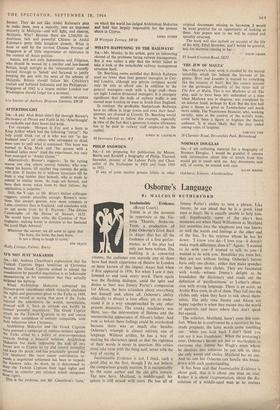WHAT'S HAPPENING TO THE RAILWAYS? SIR,-Mr. Munby, in his article,
gave an interesting resume of the problems facing railway management. But it was rather a pity that the writer failed to take a look at the remarkable railway management structure itself.
Dr. Beeching seems satisfied that British Railways need no fewer than four general managers in Cen- tral London, although any private company would only be able to afford one. In addition to the general managersâeach with a large staffâthere are eight London divisional managers. It is strangely significant that the bulk of railway traffic is not moved near London or even in South-East England.
In contrast, the profitable Netherlands Railways have no offices in large towns and even their head- quarters are situated at Utrecht. Dr. Beeching would be well advised to follow this example, especially in view of the fact that a generous London allowance has to be paid to railway staff employed in the capital.
40 Inverness Terrace, W2' JAMES H. LAUCHLIN


































 Previous page
Previous page